Leila de Lima: The woman who dares to defy Philippine president Rodrigo Duterte
- Published
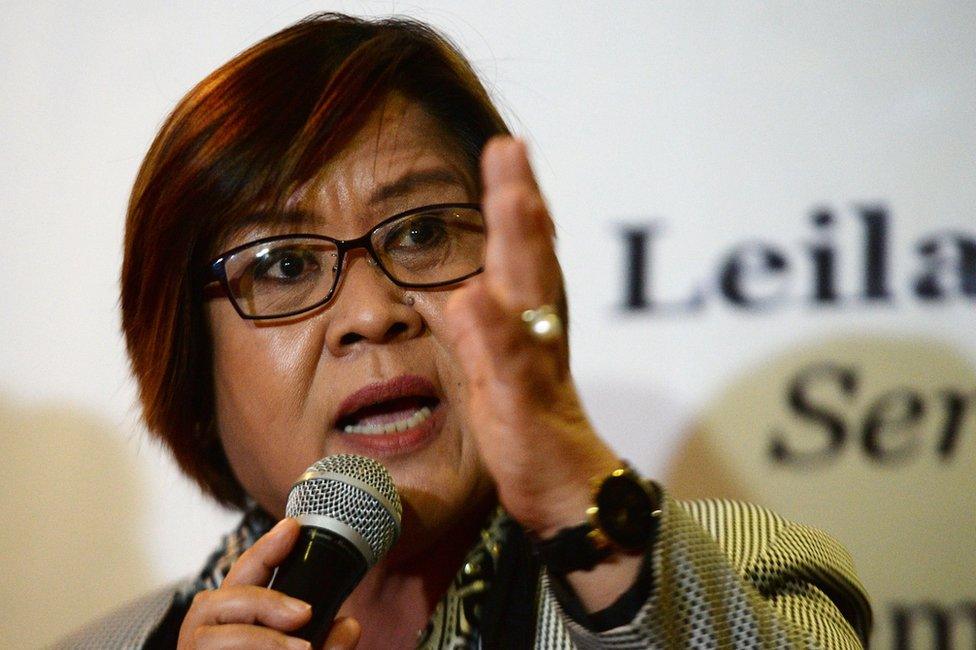
Ms de Lima was the justice secretary in the former administration
Philippine Senator Leila de Lima has made herself a thorn in the side of controversial President Rodrigo Duterte. The BBC's South East Asia correspondent Jonathan Head profiles a polarising figure, as part of a series on the Asian women likely to make the news in 2017.
Six months into his presidency Rodrigo Duterte dominates the Philippines in a way no leader has since the days of Ferdinand Marcos.
His gruff profanities and impromptu leadership style, his shockingly violent campaign against drugs, and his unpredictable policy shifts have guaranteed him constant media attention, and helped maintain strong popularity ratings in a country hungry for change.
He appals liberal Filipinos and human rights advocates, but is seen as a saviour by others. Families have been bitterly divided over the president; social media commentary about Mr Duterte has been passionate and often abusive. The president has a skilled, some say manipulative, social media team.
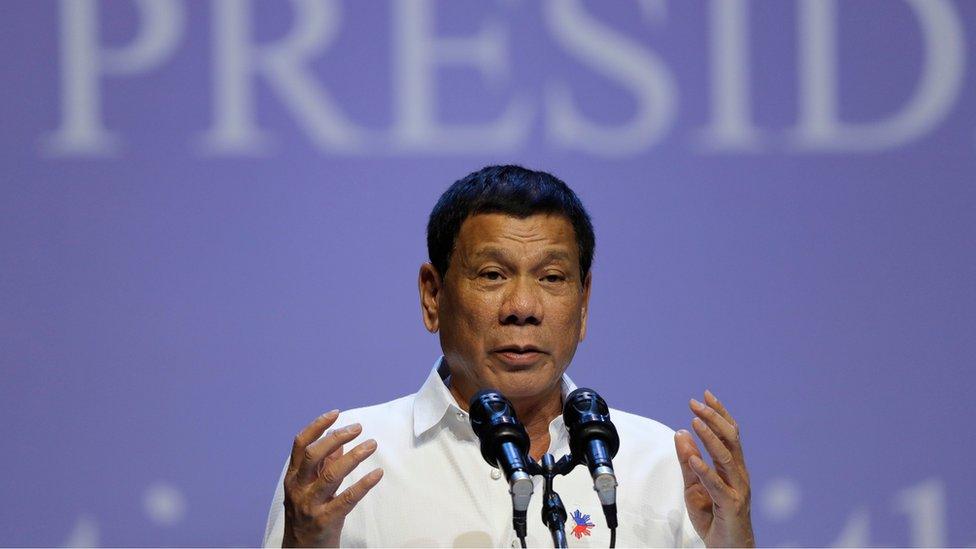
Mr Duterte is known for his brutal crackdown on drug dealers and addicts
The dramatic groundswell of support that propelled the former mayor of Davao, a very late contender, to the presidency, persuaded politicians even from rival parties to throw their support behind him in both houses of Congress, forming what is known as a "supermajority". In effect he started his six-year term with no formal opposition.
Among a handful of politicians who have stood up to the president is Senator Leila de Lima, a lawyer who served as justice secretary in the outgoing administration.

Asian women to watch in 2017

Her epic, unequal battle with Mr Duterte and his allies, taking place against a backdrop of Congressional inquiries and lurid allegations and counter-allegations in the media, has gripped the country.
'Narcissist' versus 'immoral woman'
Senator de Lima initially chaired a senate inquiry into the extrajudicial killings of drug suspects, which increased dramatically after President Duterte took office.
She brought in an alleged former death squad member from his home city of Davao to testify that Mr Duterte himself had taken part in extrajudicial killings there while he was mayor, something he has both denied and confirmed.
He has responded by accusing her of receiving payments from drug lords incarcerated in the country's biggest prison while she was justice secretary.
In September his allies in the Senate had her removed from chairing the inquiry, which then exonerated President Duterte of involvement in extrajudicial killings. At least five criminal complaints have been made against her, although she has not been indicted.
She has called him a "tired old narcissist" with a temperament ill-suited to finding lasting solutions to the country's problems.
He has called her an "immoral woman", and suggested she should hang herself. His allies in the Congress have launched their own investigation into Senator de Lima, exposing lurid details of her relationship with her driver, and getting imprisoned drug dealers to testify against her.
'Never asked to be controversial'
Leila de Lima was born in 1957 and brought up in the Bicol region of the main island of Luzon. Her father was a lawyer and ran the national Election Commission in the 1990s.
Ms De Lima also studied law, graduating with the 8th highest marks in the country in 1985. She has two sons, but her marriage ended in 2001, something she blames on her commitment to her work.
She practised law, with an interlude working in the House of Representatives, before being appointed as chair of the Commission on Human Rights by then-President Gloria Arroyo in 2008.
Already known for being an outspoken advocate of "justice without fear or favour", she launched an investigation into allegations that then mayor Rodrigo Duterte was running death squads in Davao in his popular anti-crime campaign.
She held a series of hearings in Davao in 2009, but was unable to find witnesses or clear evidence that linked Mr Duterte or the police to the mysterious hit squads which killed more than 1,000 people over the previous decade, many of them children.
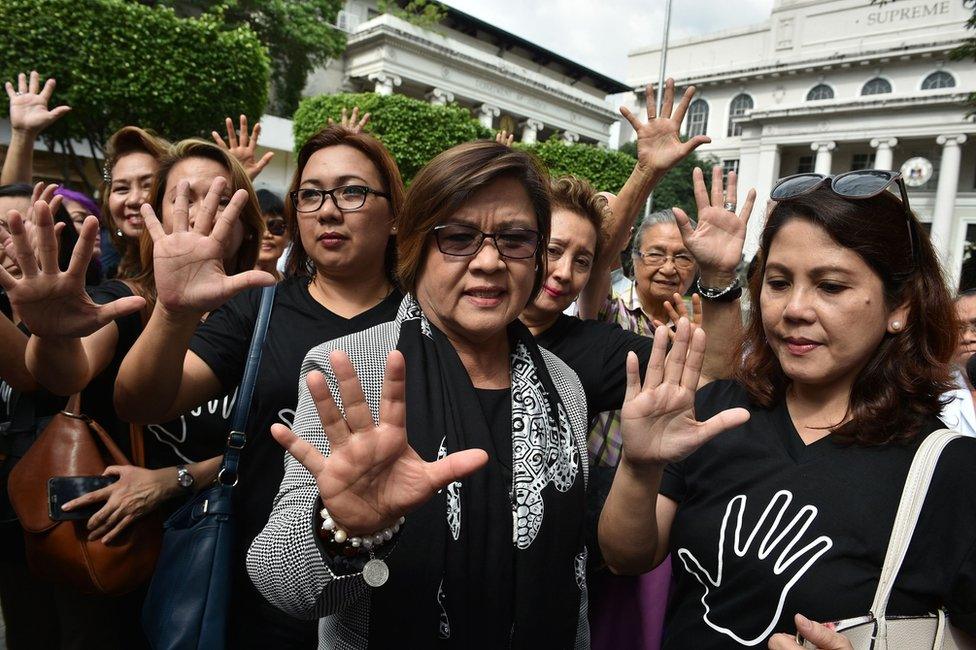
Ms de Lima has also garnered supporters for her campaign against Mr Duterte
When she was appointed justice secretary in 2010 by the-President Benigno Aquino III she showed an undiminished willingness to go after high-profile people.
In 2011, she had former-President Arroyo arrested as she was about to board a flight to seek hospital treatment overseas. In 2013, she filed criminal charges against three prominent senators for alleged misuse of development funds.
She also took on the country's third largest church, Iglesia ni Cristo, over an alleged kidnapping case, prompting large demonstrations outside her office.
Some even sympathetic commentators accused the Justice Secretary of seeking controversy, of fighting too many of her battles through media publicity.
"Some have called me a controversial public figure," she said last year.
"I will not and cannot deny that. But I never asked to be controversial. In fact, it would have been impossible to remain uncontroversial when high profile cases kept arising. The only way to keep a low profile is not to do anything worth public notice."
Her critics, though, say that in practice not much changed in the poor performance of the justice system under her watch. In particular they point to the proliferation of drug dealing, even manufacturing, in the New Bilibid Prison, the country's largest.
Ms De Lima herself led a well-publicised raid on the prison in December 2014.
Behind the drab exteriors of the cells occupied by some of the most well-known inmates they discovered astonishing levels of luxury - saunas, fully-stocked bars, an inflatable sex doll, mobile phones, and stocks of narcotics and firearms.
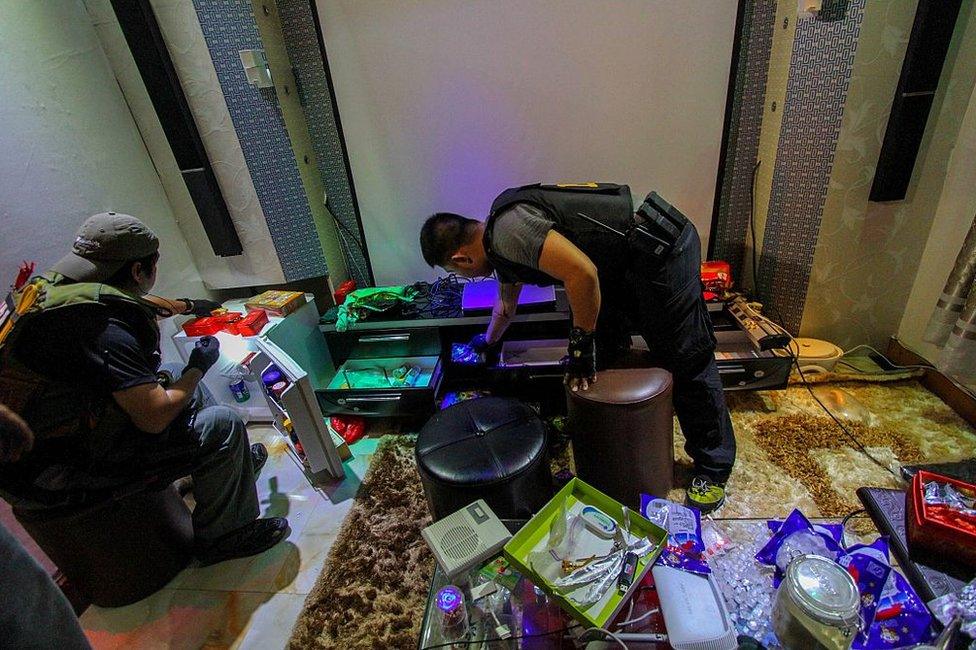
Drugs and alcohol were found in some prison cells during the raid
Nineteen prisoners were transferred and several officials punished. But stories of drug-dealing in the prison continued, so that in July this year the running of it was taken over by police special forces.
President Duterte has used the prison scandal to discredit Senator de Lima.
His allies brought 10 people, seven of them prison inmates, to testify to a House of Representatives inquiry that drug money was paid to Ms De Lima's driver, and lover, to help fund her campaign for a senate seat.
The driver, Ronnie Dayan, with whom Ms De Lima admits having a seven-year romantic relationship, also testified against her.
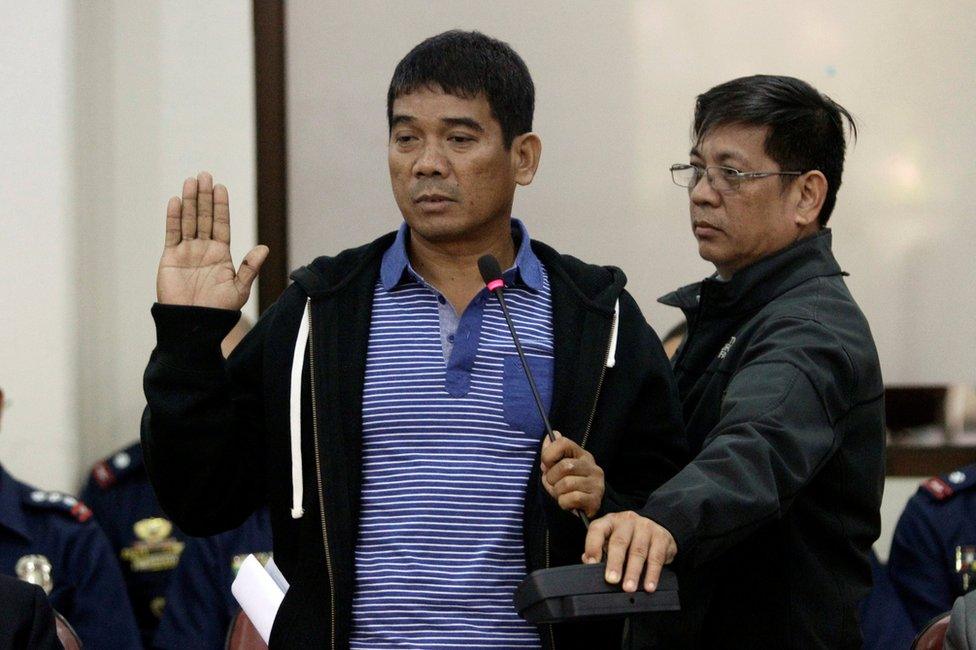
Mr Dayan (left) was Ms de Lima's driver and bodyguard
Going down fighting?
Senator de Lima has dismissed all the allegations as absurd; her friends point out that she has no obvious signs of wealth, and they argue that it is easy for an administration as dominant as President Duterte's to coerce people, especially prisoners, to speak against her. She has certainly made plenty of enemies in her career.
Her personal life has been laid out in what must be excruciating detail; she has been vilified by President Duterte's supporters on social media.
She has few allies in mainstream politics, and none that can help her take on the Duterte roller-coaster. Her future now hangs on potential criminal indictments, and on moves to strip her of her senate seat.
Yet Senator de Lima remains defiant, insisting she will be vindicated, and calling now for international intervention to investigate the drug killings.
She continues to campaign against the reintroduction of the death penalty. This month she was honoured by the US publication Foreign Policy as one of its top Global Thinkers of 2016, for her willingness to "stand up to an extremist leader".
If she is going down, she is going down fighting.